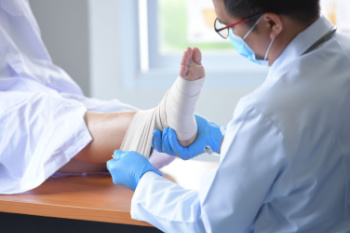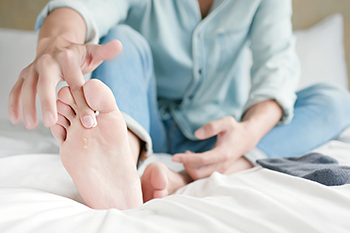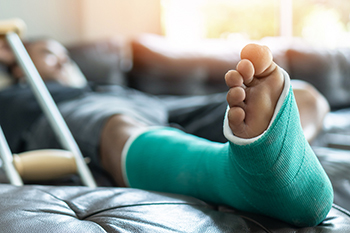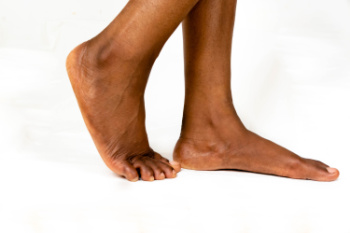Connect With Us
Blog

Ankle injuries are common, and it can be difficult to tell the difference between a sprain and a break. A sprained ankle occurs when the ligaments are stretched or torn, often from twisting or rolling the foot during sports or walking on uneven ground. A broken ankle, or fracture, happens when one or more bones in the ankle joint break, usually from a fall, direct impact, or severe twisting injury. Symptoms of both include pain, swelling, bruising, and difficulty walking. However, a break may cause more intense pain, visible deformity, or an inability to bear weight at all. The area might feel tender to the touch and appear misshapen or unstable. A podiatrist can perform a physical exam, take X-rays, and determine whether the injury is a sprain or fracture. Treatment may involve rest, bracing, targeted exercises, or, in some cases, surgery. If you have injured your ankle, it is suggested that you schedule an appointment with a podiatrist for appropriate treatment solutions.
Broken ankles need immediate treatment. If you are seeking treatment, contact the foot specialists from Affiliates in Foot Care, P.C.. Our doctors can provide the care you need to keep you pain-free and on your feet.
Broken Ankles
A broken ankle is experienced when a person fractures their tibia or fibula in the lower leg and ankle area. Both of these bones are attached at the bottom of the leg and combine to form what we know to be our ankle.
When a physician is referring to a break of the ankle, he or she is usually referring to a break in the area where the tibia and fibula are joined to create our ankle joint. Ankles are more prone to fractures because the ankle is an area that suffers a lot of pressure and stress. There are some obvious signs when a person experiences a fractured ankle, and the following symptoms may be present.
Symptoms of a Fractured Ankle
- Excessive pain when the area is touched or when any pressure is placed on the ankle
- Swelling around the area
- Bruising of the area
- Area appears to be deformed
If you suspect an ankle fracture, it is recommended to seek treatment as soon as possible. The sooner you have your podiatrist diagnose the fracture, the quicker you’ll be on the way towards recovery.
If you have any questions, please feel free to contact our office located in Woburn, MA . We offer the newest diagnostic and treatment technologies for all your foot care needs.

Fungal and bacterial foot infections can develop when microorganisms enter through small cracks or cuts in the skin. This typically occurs in moist environments like public showers, locker rooms, or around pools. One common fungal infection is athlete’s foot, which may cause peeling skin, redness, itching, or blisters, often between the toes or along the soles. If left untreated, it can spread and increase the risk of a toenail infection called onychomycosis, which can result in thickened, yellowed, or brittle nails. Bacterial infections, such as cellulitis or foot abscesses, may cause swelling, pain, heat, and drainage from the affected area and may spread quickly, if not properly treated. A podiatrist can perform a thorough exam and determine whether the infection is fungal or bacterial, before providing the appropriate treatment. If you believe you have a fungal or bacterial foot infection, it is suggested that you schedule an appointment with a podiatrist for an exam, diagnosis, and appropriate treatment.
Athlete’s Foot
Athlete’s foot is often an uncomfortable condition to experience. Thankfully, podiatrists specialize in treating athlete’s foot and offer the best treatment options. If you have any questions about athlete’s foot, consult with the foot specialists from Affiliates in Foot Care, P.C.. Our doctors will assess your condition and provide you with quality treatment.
What Is Athlete’s Foot?
Tinea pedis, more commonly known as athlete’s foot, is a non-serious and common fungal infection of the foot. Athlete’s foot is contagious and can be contracted by touching someone who has it or infected surfaces. The most common places contaminated by it are public showers, locker rooms, and swimming pools. Once contracted, it grows on feet that are left inside moist, dark, and warm shoes and socks.
Prevention
The most effective ways to prevent athlete’s foot include:
- Thoroughly washing and drying feet
- Avoid going barefoot in locker rooms and public showers
- Using shower shoes in public showers
- Wearing socks that allow the feet to breathe
- Changing socks and shoes frequently if you sweat a lot
Symptoms
Athlete’s foot initially occurs as a rash between the toes. However, if left undiagnosed, it can spread to the sides and bottom of the feet, toenails, and if touched by hand, the hands themselves. Symptoms include:
- Redness
- Burning
- Itching
- Scaly and peeling skin
Diagnosis and Treatment
Diagnosis is quick and easy. Skin samples will be taken and either viewed under a microscope or sent to a lab for testing. Sometimes, a podiatrist can diagnose it based on simply looking at it. Once confirmed, treatment options include oral and topical antifungal medications.
If you have any questions, please feel free to contact our office located in Woburn, MA . We offer the newest diagnostic and treatment technologies for all your foot care needs.

Traumatic foot injuries often involve sudden force, such as a fall, twist, or direct impact. These injuries may damage soft tissues like ligaments, tendons, and muscles, in addition to affecting bones and joints. Sprains, ruptured tendons, dislocations, and severe bruising are common examples. Unlike overuse injuries that develop gradually, traumatic injuries cause immediate pain and often lead to swelling, bruising, or an inability to bear weight. Because the foot contains many small bones and delicate structures, even a single injury can affect balance and mobility. Prompt treatment helps prevent long-term complications. A podiatrist can assess the severity, recommend imaging, if needed, and guide recovery through bracing or surgery, if required. If you have experienced a sudden injury and your foot remains painful or unstable, it is suggested that you see a podiatrist for a full evaluation and appropriate treatment plan.
Foot and ankle trauma is common among athletes and the elderly. If you have concerns that you may have experienced trauma to the foot and ankle, consult with the foot specialists from Affiliates in Foot Care, P.C.. Our doctors will assess your condition and provide you with quality foot and ankle treatment.
Foot and ankle trauma cover a range of injuries all over the foot; common injuries include:
- Broken bones
- Muscle strains
- Injuries to the tendons and ligaments
- Stress fractures
Symptoms
Symptoms of foot and ankle injuries vary depending on the injury, but more common ones include:
- Bruising
- Inflammation/ Swelling
- Pain
Diagnosis
To properly diagnose the exact type of injury, podiatrists will conduct a number of different tests. Some of these include sensation and visual tests, X-rays, and MRIs. Medical and family histories will also be taken into account.
Treatment
Once the injury has been diagnosed, the podiatrist can than offer the best treatment options for you. In less severe cases, rest and keeping pressure off the foot may be all that’s necessary. Orthotics, such as a specially made shoes, or immobilization devices, like splints or casts, may be deemed necessary. Finally, if the injury is severe enough, surgery may be necessary.
If you have any questions, please feel free to contact our office located in Woburn, MA . We offer the newest diagnostic and treatment technologies for all your foot care needs.

Flat feet, also known as fallen arches, occur when the arches of the feet collapse or never fully develop. This condition can be congenital or happen over time due to injury, arthritis, obesity, or wear and tear. People with flat feet may notice their feet appear completely flat when standing, with little to no arch visible. Symptoms include foot pain, especially in the heel or arch, swelling along the inside of the ankle, and difficulty standing on tiptoes. Flat feet can also lead to problems in the ankles, knees, or hips as a result of altered alignment. A podiatrist can diagnose flat feet through a physical examination and gait analysis. Treatment may include custom orthotics, supportive footwear, stretching exercises, or, in severe cases, surgery. Proper care helps reduce discomfort and improve foot function. If you have flat feet, it is suggested that you schedule an appointment with a podiatrist who can offer relief tips, and help you to monitor this condition.
Flatfoot is a condition many people suffer from. If you have flat feet, contact the foot specialists from Affiliates in Foot Care, P.C.. Our doctors will treat your foot and ankle needs.
What Are Flat Feet?
Flatfoot is a condition in which the arch of the foot is depressed and the sole of the foot is almost completely in contact with the ground. About 20-30% of the population generally has flat feet because their arches never formed during growth.
Conditions & Problems:
Having flat feet makes it difficult to run or walk because of the stress placed on the ankles.
Alignment – The general alignment of your legs can be disrupted, because the ankles move inward which can cause major discomfort.
Knees – If you have complications with your knees, flat feet can be a contributor to arthritis in that area.
Symptoms
- Pain around the heel or arch area
- Trouble standing on the tip toe
- Swelling around the inside of the ankle
- Flat look to one or both feet
- Having your shoes feel uneven when worn
Treatment
If you are experiencing pain and stress on the foot you may weaken the posterior tibial tendon, which runs around the inside of the ankle.
If you have any questions, please feel free to contact our office located in Woburn, MA . We offer the newest diagnostic and treatment technologies for all your foot care needs.
